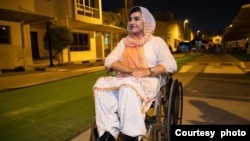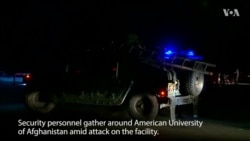Breshna Musazai endured 19 agonizing months in Qatar, anxiously awaiting resettlement to the United States as a refugee.
Forced to flee Afghanistan just two days after the Taliban seized Kabul in 2021, Musazai found herself separated from her parents and her dreams shattered.
A dull ache in her right leg was a physical echo of the trauma she had endured.
A polio paraplegic in the left leg, Musazai took three bullets in her right leg from suspected Taliban assailants in 2016.
“I was praying at a mosque inside the university’s campus when the shooting started,” Musazai said, recalling the attack on the American University of Afghanistan, or AUAF.
Thirteen people, including seven students and a teacher, were killed, and 50 were injured in the complex attack that went on for hours.
No group claimed responsibility for the attack, although the Afghan government blamed the Taliban.
A year after the attack, after doctors at First Baptist Medical Center in Dallas, Texas, performed surgery on her bullet wounds, Musazai was able to return to AUAF.
Following her graduation in 2018, Musazai embarked on a career focused on volunteering and advocating for women's rights.
"Out of my four sisters," Musazai told VOA from her home in Virginia, "I'm the only one who has been to university."
Her parents, although they never went to college, supported her difficult pursuit of education.
“I wanted to be a doctor, but the AUAF did not have a medical school, so I decided to study law,” she said.
Opportunities in the US
Upon arriving in the United States, Musazai sought out paralegal and English legal language classes to continue her education.
"There are a lot of opportunities here," she said, explaining her plans to pursue a master’s degree in law before working as a lawyer.
Since the Taliban's return to power in Afghanistan, the U.S. government has admitted more than 80,000 Afghans.
As special emigrants and refugees, they are entitled to live and work across the United States. Many receive essential support, including medical care, food and other forms of assistance, to aid in their resettlement.
“Most of my classmates have left Afghanistan, but I heard some of them have got married,” she told VOA.
Musazai did not want to leave her home country but feared for her life under Taliban rule.
Despite the grim situation in Taliban-ruled Afghanistan, particularly for women, Musazai holds onto the hope that Afghan girls will regain access to secondary education.
"Every other Muslim country lets girls go to school. So, why does Afghanistan deny its girls this basic right?" she asked.
As Afghanistan's schools reopen for a third year under Taliban rule, there is no sign the regime will lift its ban on secondary and university education for girls.
International human rights organizations condemn the Taliban's policy of excluding girls from secondary education, calling it gender apartheid.
“I hope [the Taliban] understand that girls’ education is good for Afghanistan and even good for them,” she said. “It makes no sense, and it serves no one’s interest to shut schools for anyone.”







